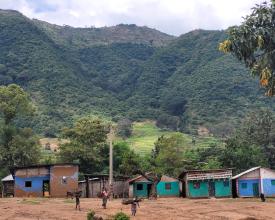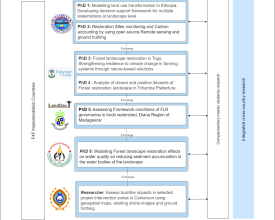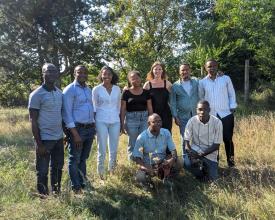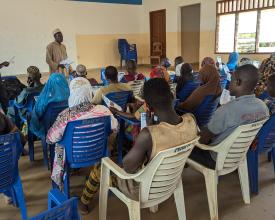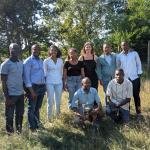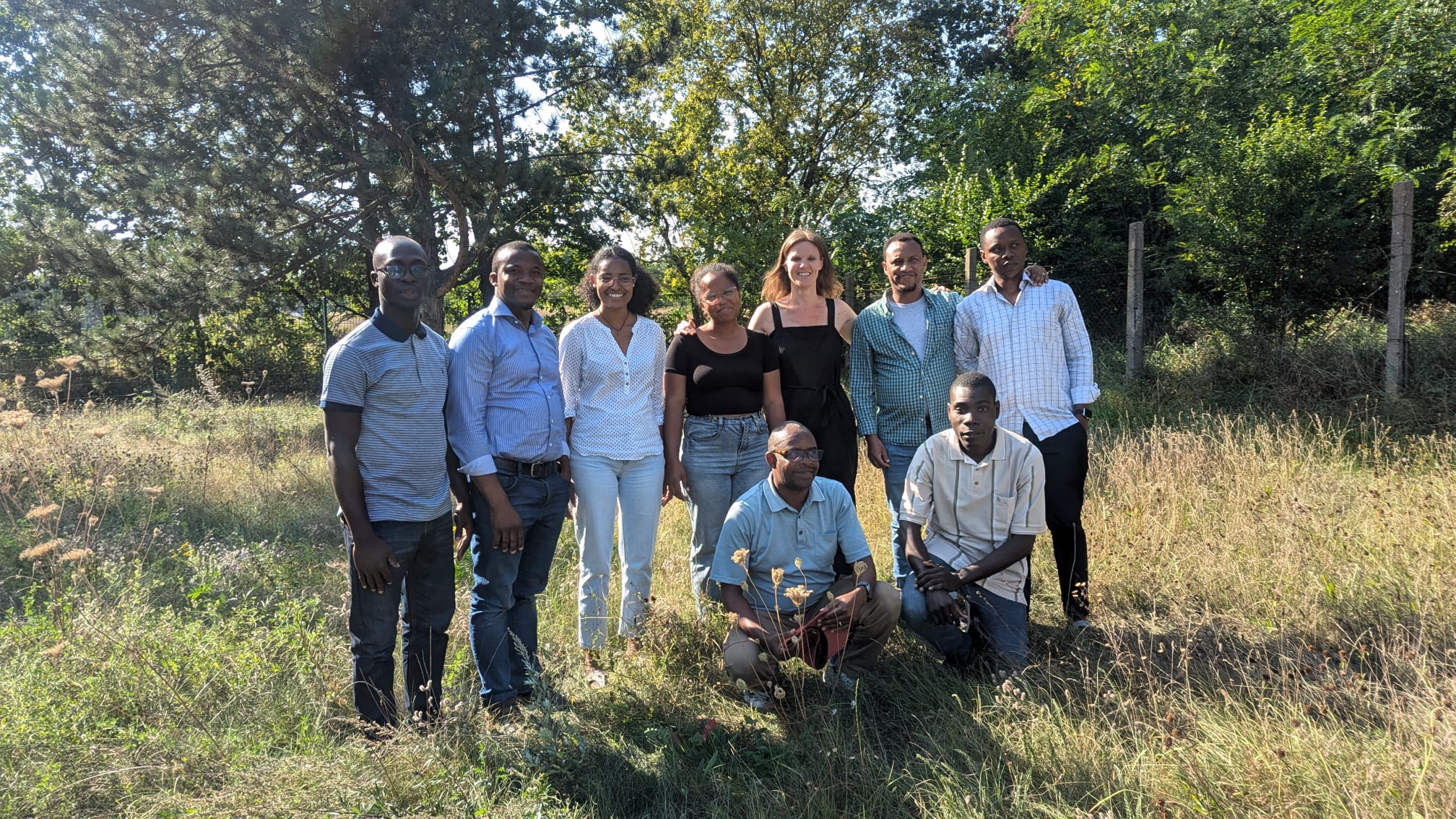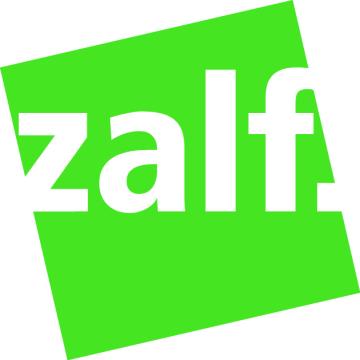
ARBRES : Accompagner la recherche sur la restauration
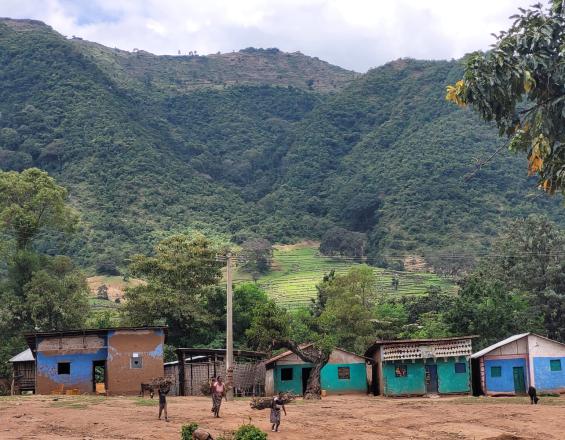
La restauration est une question complexe qui nécessite des actions conjointes. La collaboration des décideurs politiques, des praticiens et des scientifiques est nécessaire pour développer et suivre les solutions les mieux adaptées au contexte afin de rétablir l'intégrité écologique et d'améliorer le bien-être humain dans les paysages déboisés ou dégradés. Actuellement, l'accent est mis sur les solutions écologiques et techniques, négligeant ainsi la dimension sociale de la restauration. Afin de renforcer l'approche socio-écologique de la restauration et la collaboration à l'interface science-pratique, le projet TREES accompagne la recherche sur les stratégies de RPF mises en œuvre par le projet mondial Forests4Future (F4F) de la GIZ. L'accent est mis sur les effets écologiques et socio-économiques ainsi que sur les questions de gouvernance. Des étudiants en master et en doctorat basés dans des universités en Allemagne et dans les pays participant au projet F4F sont sélectionnés pour travailler en tandem sur des sujets pertinents pour le projet. Alors que chaque étudiant a son propre objectif de recherche, la collecte de données est planifiée et mise en œuvre dans les tandems binationaux.
Contexte
Défis à relever
Si la recherche universitaire traditionnelle est souvent axée sur les problèmes, elle manque souvent d'un exécutant qui utilise les résultats et les recommandations pour une mise en œuvre pratique. La recherche d'accompagnement comble cette lacune en réduisant le délai entre la recherche et l'action sur le terrain. La recherche d'accompagnement a permis de produire des connaissances ayant une pertinence pratique directe et répondant à des normes académiques élevées grâce à l'interaction de la pratique et de l'analyse scientifique. En impliquant les acteurs du développement dans la recherche transdisciplinaire, une boucle de rétroaction itérative dans la conception de la recherche a généré des informations et des recommandations utiles qui contribuent à la réussite de la mise en œuvre du projet.
Emplacement
Traiter
Résumé du processus
La recherche qui l'accompagne contribue à l'ensemble des connaissances internationales sur la mise en œuvre du programme de restauration des paysages forestiers. L'objectif est de créer une large sensibilisation aux recommandations fondées sur des preuves par le biais de la documentation, de la publication et de la diffusion de résultats scientifiques provenant de différents pays. ZALF coordonne la recherche d'accompagnement en fournissant une supervision et une co-supervision aux différentes recherches menées dans le pays de mise en œuvre. Les doctorants et les étudiants en master interagissent en tandems pour travailler sur des projets de recherche interconnectés. Les résultats des différentes recherches menées dans les pays sont entrelacés, et les implications des recherches transnationales ainsi que les notes politiques sont développées pour tirer des leçons des différents pays de mise en œuvre. Les résultats de la recherche sont communiqués sous différents formats adaptés au public. Les résultats globaux de la recherche sont communiqués en temps opportun à l'interface de la science et de la pratique, en collaboration avec le projet Forêts 4 Future de la GIZ, afin de mettre en œuvre les recommandations formulées à l'issue de la recherche.
Blocs de construction
Tandems de recherche internationaux et co
Pour faciliter les collaborations mondiales, le renforcement des structures de recherche internationales, le développement des capacités et l'apprentissage global, le projet TREES, en tant que solution, s'appuie fortement sur des partenariats internationaux. L'équipe elle-même est composée dans la plupart des pays de tandems de recherche internationaux, dans lesquels les étudiants en doctorat et en master sont originaires du pays d'étude ainsi que d'Allemagne ou d'un autre pays. Alors que chaque étudiant a son propre objectif de recherche, la collecte de données est planifiée et mise en œuvre dans les tandems binationaux. La supervision est assurée dans le cadre de tandems de supervision internationaux où, dans chaque pays, une université prend la direction des opérations et la co-supervision est assurée par l'organisation chef de file du projet.
Facteurs favorables
La mise en place d'équipes de recherche binationales contribue à améliorer la réflexion sur la complexité grâce à l'intégration de perspectives et de disciplines multiples. Cela facilite la recherche sur la mise en œuvre de la RPF pour une meilleure analyse et l'élaboration de solutions, ainsi que le renforcement des capacités et l'apprentissage global par le biais de collaborations Nord-Sud et Sud-Sud. Les visites conjointes sur le terrain peuvent faciliter l'accès des étudiants aux sites d'étude, l'interaction avec les acteurs sur le terrain et l'augmentation de la taille des échantillons si les questionnaires sont combinés.
Leçon apprise
L'établissement de tandems de recherche internationaux d'étudiants en doctorat et en master et la constitution d'équipes internationales de co-supervision ouvrent de nouveaux espaces d'apprentissage et de nouvelles opportunités de collaboration. Différentes expertises et perspectives peuvent être intégrées dans les différents projets d'étude des thèses de doctorat et de master, dans la conception et la mise en œuvre de la recherche. Des méthodes de recherche diversifiées peuvent être mises en œuvre de manière complémentaire afin d'approfondir l'analyse liée à la RPF et les perspectives d'interprétation combinées enrichissent les résultats de la recherche. Si des questions sur les données se posent ou si une vérification est nécessaire à l'issue de la visite sur le terrain, la structure en tandem facilite les visites de suivi sur le terrain pour compléter ou vérifier les résultats. Les connaissances dérivées et communiquées via de multiples canaux en Allemagne et dans les pays F4F peuvent améliorer le dialogue à l'interface entre la politique, la pratique et la science au sein des pays et entre eux.
Séjours de recherche internationaux
Un programme annuel de mobilité internationale de 3 mois par an a été mis en place pour tous les doctorants basés dans les pays de mise en œuvre de F4F. Le programme a été conçu de manière à ce que tous les doctorants se rendent en même temps dans l'institution d'accueil en Allemagne (ZALF), afin de faciliter un système structuré de supervision des doctorats. Pendant le séjour en Allemagne, le séjour a consisté en de multiples composantes interconnectées, telles que : des activités de recherche documentaire, l'intégration dans les réunions et événements de l'institution d'accueil, des ateliers conjoints sur la planification de projets, des formations sur les méthodes, des réflexions sur les progrès du doctorat (chances et défis), des réunions de statut en personne avec GIZ/F4F, ainsi que des activités de sensibilisation conjointes, y compris par exemple un symposium par GIZ et ZALF sur la restauration dans le Sud global à Bonn et un atelier sur le concept de la recherche d'accompagnement à la TropentagConference2023 à Berlin. Les étudiants ont également été encouragés à participer à d'autres formations et conférences en fonction de leurs intérêts et besoins individuels.
Facteurs favorables
La mise en place d'un programme de mobilité internationale accueillant simultanément tous les doctorants travaillant dans et sur les différents pays de mise en œuvre a permis un travail d'équipe en personne qui a fortement influencé le développement de la confiance mutuelle, ainsi qu'une communication et une collaboration de haute qualité, essentielles également pour l'avancement et la réussite du projet pendant la période de travail d'équipe à distance. En outre, les séjours de recherche alignés ont favorisé les échanges thématiques entre pays, encouragé la recherche de synthèse et contribué à l'amélioration du dialogue Nord-Sud et Sud-Sud et au renforcement des capacités en général. Avec trois séjours de mobilité au cours d'années consécutives, les doctorants se sont embarqués dans un voyage commun avec des points d'interaction et de réflexion réguliers sur le sujet de recherche et les activités liées au doctorat. Les effets positifs sont devenus de plus en plus visibles au fil du temps en ce qui concerne la confiance au sein de l'équipe et l'intensité de la collaboration, les connaissances et les compétences liées à la recherche doctorale et l'intensification de la recherche transnationale et de la recherche de synthèse.
Leçon apprise
La mise en place d'un programme structuré de séjour de mobilité internationale a permis non seulement d'acquérir une expérience de recherche internationale dans un institut partenaire en Allemagne (ZALF), mais aussi de favoriser l'interaction directe entre les différents membres de l'équipe. De cette manière, beaucoup d'espace a été créé pour la recherche, la discussion et l'apprentissage en commun. Des ateliers de planification de projets communs, des formations sur les méthodes et approches sélectionnées qui ont été utilisées par les membres de l'équipe dans les différents pays, mais aussi des ateliers de planification et de réflexion sur le doctorat ont été organisés pendant cette période. Les séjours de mobilité ont également permis une interaction directe avec l'équipe mondiale de la GIZ/F4F et d'autres acteurs de la science, de la politique et de la pratique par le biais de symposiums, d'ateliers et de la participation à des conférences internationales.
Recherche en synergie
Le projet TREES utilise une approche multiéchelle et interdisciplinaire pour synthétiser les données provenant d'analyses environnementales, sociales et économiques, afin de fournir une compréhension holistique des impacts de la RPF en Afrique, en particulier en Afrique de l'Est et de l'Ouest. Pour ce faire, l'objectif global est d'atténuer les effets du changement climatique en Afrique grâce à une recherche de synthèse qui éclaire les politiques et les pratiques en matière de RPF. Cette approche permet une compréhension nuancée des pratiques de RPF et de leurs impacts, qui sont adaptables à différentes régions. En combinant des données provenant de diverses disciplines, notamment les sciences environnementales, les sciences sociales et les analyses économiques, le projet permet une compréhension holistique des pratiques de RPF et de leurs interactions complexes. Par conséquent, des méthodes de recherche similaires sont appliquées afin d'examiner des problèmes similaires dans des contextes différents. Les méthodes de recherche pluridisciplinaires appliquées dans différents pays sont contextualisées afin de proposer des solutions adaptées au contexte du pays.
Facteurs favorables
Alors que les doctorats se concentrent sur des sujets spécifiques à un pays, le projet synergie permet une synthèse entre les pays afin de contribuer à l'élargissement et à l'externalisation des résultats de la recherche, des expériences obtenues et des pratiques liées à la RPF. En outre, les thèses de master soutiennent le contexte général du projet en traitant de sujets spécifiques au niveau national. Les recherches menées par les étudiants en master et en doctorat sont étroitement liées, et les résultats de la recherche sont approfondis si les résultats peuvent être comparés et si des recommandations peuvent être tirées du contexte d'un pays à l'autre.
Leçon apprise
La recherche sur la RPF dans les différents pays de mise en œuvre est interdépendante. Les pratiques locales réussies identifiées dans le cadre du projet sont présentées comme des modèles d'adaptation et de mise à l'échelle dans divers contextes, ce qui renforce les contributions à l'agenda mondial de la RPF.
Cette représentation géographique diversifiée garantit que le projet bénéficie d'un large éventail de perspectives et d'expériences pertinentes pour les différents contextes écologiques et socio-économiques de l'Afrique. Le projet génère des informations exploitables pour l'action climatique et les efforts de restauration des terres au-delà des études de cas, ce qui permet de tirer des conclusions et des recommandations dans différents contextes et à différentes échelles (locale à régionale/africaine). Les résultats de la recherche aident à étayer scientifiquement les pratiques de RPF développées par F4F.
Diffusion et apprentissage
L'élaboration de différentes méthodes de diffusion renforce la communication à l'interface de la recherche, de la politique et de la pratique. Si les conclusions essentielles d'une étude peuvent rester cohérentes, la manière dont ces résultats sont partagés doit être adaptée aux besoins, aux préférences et aux capacités spécifiques des différentes parties prenantes. Cette approche garantit que l'information est non seulement accessible, mais qu'elle a également un impact, permettant aux parties prenantes de prendre des décisions en connaissance de cause ou de prendre des mesures appropriées.
Par exemple, dans le contexte de la recherche d'accompagnement de la mise en œuvre de la RPF, la manière dont les résultats sont communiqués aux responsables de la mise en œuvre et aux décideurs politiques diffère de l'approche utilisée pour les publics universitaires. Les décideurs politiques et les responsables de la mise en œuvre travaillent souvent dans des environnements où le rythme est rapide et où ils ont besoin d'informations claires, concises et exploitables. Les décideurs politiques et les personnes chargées de la mise en œuvre tirent le plus grand profit d'une communication concise et directe qui met en lumière des idées exploitables, souvent à l'écart du format détaillé et structuré des articles scientifiques.
En reconnaissant ces différences et en s'y adaptant, notre projet, en tant que recherche d'accompagnement, comble le fossé entre la production de preuves et l'application pratique, en favorisant des liens plus forts et des collaborations plus significatives entre les mondes de la science, de la politique et de la pratique.
Facteurs favorables
Le succès de l'application de différents mécanismes de diffusion dépend de l'engagement ferme de l'équipe de recherche à adapter les styles de communication des résultats aux différents publics. Les résultats de la recherche sont préparés pour être publiés dans des revues scientifiques, mais aussi sous forme de fiches d'information, de notes de synthèse et d'affiches, conçues pour communiquer les résultats aux parties prenantes non universitaires. La coopération avec les responsables de la mise en œuvre de la RPF permet également à la recherche qui l'accompagne d'organiser avec succès des ateliers participatifs au niveau local, des webinaires et des symposiums conjoints au cours desquels les résultats et les idées complémentaires de la recherche et de la pratique sont discutés. Les résultats sont également intégrés dans les cours et les programmes universitaires.
Leçon apprise
Dans le cadre de notre projet de recherche, nous adaptons les stratégies de diffusion et de sensibilisation aux besoins et aux contextes de nos diverses parties prenantes. Pour les responsables locaux de la mise en œuvre et les communautés, la communication est conçue pour être interactive et engageante, en s'appuyant fortement sur des présentations orales et des outils visuels tels que des affiches ou des dépliants, ainsi que sur la traduction dans les langues locales. Ces outils sont combinés au dialogue pour faciliter la compréhension mutuelle et encourager la collaboration. En adaptant l'approche au public, qu'il s'agisse de décideurs politiques ayant besoin d'informations concises ou de communautés locales ayant besoin de méthodes participatives et visuelles, nous nous assurons que le message principal de notre recherche est transmis de manière efficace et qu'il soutient l'application dans le monde réel. En organisant différents webinaires où la recherche et la pratique sont présentées sur la même plateforme, nous avons échangé et développé des stratégies qui aident à communiquer les résultats de la recherche à des publics non universitaires. En outre, grâce à des présentations lors de différentes conférences, notre mécanisme de diffusion de la recherche s'est étendu à un public plus large, en plus des pays de mise en œuvre de la LRF.
Impacts
La solution a contribué à une recherche académique plus systématique sur la restauration, incorporant différentes bases de connaissances scientifiques, politiques et pratiques, ainsi que le domaine en particulier. La recherche de synthèse transnationale relative à la restauration et à l'adaptation au changement climatique a été renforcée, associée à diverses activités de dialogue qui améliorent la circulation des connaissances entre les différents groupes d'acteurs, de l'échelle locale à l'échelle mondiale. Sur le plan social, les projets ont mis en avant la nécessité d'adopter des approches socio-écologiques plus intégrées en s'engageant profondément avec les différentes parties prenantes au niveau local, mais aussi en explorant la manière dont les activités de restauration sont liées aux relations sociétales, ce qui permet de mieux planifier les activités futures de manière à ce qu'elles profitent à la fois à la société et à l'environnement. Les modèles d'interaction entre les parties prenantes ont également été évalués de manière plus approfondie, mettant en évidence les déséquilibres entre les différents acteurs et donc les points d'entrée possibles pour travailler à une implication plus égale et plus juste dans la RPF.
Bénéficiaires
Les bénéficiaires de la recherche d'accompagnement sont les parties prenantes qui travaillent sur la RPF et qui peuvent mettre en œuvre les options de RPF recommandées, élaborer et mettre en œuvre des politiques, et s'engager avec les communautés locales.
Objectifs de développement durable
Histoire
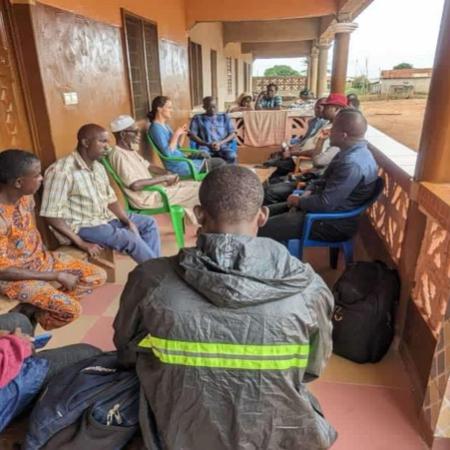
"Lorsque je suis arrivée en Allemagne il y a deux ans pour mon premier séjour de recherche au ZALF, j'étais ravie. Il s'agissait d'une étape importante dans le parcours de mon doctorat. Il m'a donné l'occasion de travailler dans un environnement de recherche international. La possibilité d'élargir mon réseau a été l'un des aspects les plus gratifiants de mon expérience. J'ai rencontré des collègues talentueux dont les perspectives ont élargi ma compréhension de ma recherche grâce à mon travail dans le groupe SusLand. Au-delà de la ZALF, les conférences et les cours de formation organisés en Allemagne et en Europe m'ont permis d'entrer en contact avec des chercheurs de différents domaines. Cela a suscité de nouvelles idées qui ont enrichi mon travail. Ces interactions ont été cruciales et m'ont permis d'envisager mes recherches sous des angles nouveaux et passionnants. Travailler avec TREES a permis à des étudiants africains de se rencontrer et d'apprendre les uns des autres. Nous avons partagé nos expériences et nous nous sommes soutenus mutuellement. Au ZALF, j'ai veillé à tirer pleinement parti des ressources mises à ma disposition. Qu'il s'agisse de participer à des ateliers, d'engager des discussions avec des collègues ou de solliciter des commentaires sur mon travail, j'ai saisi toutes les occasions d'apprendre et de progresser. Mais c'est surtout le soutien de mes collègues et de mes superviseurs dans le cadre du projet TREES et de SusLand qui a fait la différence. Les liens que j'ai partagés avec les autres étudiants africains et le groupe international plus large ont été une source d'encouragement. Leur compréhension m'a aidé à relever les défis et m'a rappelé que je n'étais pas seul dans cette aventure".
Par le doctorant : Hamy
Madagascar, Antananarivo/ZALF
"La participation au projet TREES a été une expérience transformatrice qui a mis en évidence le pouvoir de la collaboration internationale. Dans le cadre de ma recherche de maîtrise sur la restauration des paysages forestiers, j'ai eu l'occasion unique de travailler au sein d'un tandem international au ZALF. Cette approche, qui associe des étudiants allemands à des étudiants locaux dans le pays d'étude, a créé un échange dynamique de connaissances et de perspectives. Au-delà de la collaboration en tandem, les réunions hebdomadaires avec les étudiants en maîtrise et en doctorat travaillant sur la RPF dans le monde entier ont été d'un soutien crucial tout au long de mon mémoire de maîtrise. Cette équipe interdisciplinaire, composée d'étudiants de différents pays et niveaux académiques, a guidé les étapes initiales de ma conception de recherche jusqu'aux étapes finales de ma thèse. J'encourage vivement toute personne intéressée par la restauration et la durabilité à saisir des opportunités comme celle-ci. Non seulement elles élargissent les horizons académiques, mais elles favorisent également l'épanouissement personnel et une meilleure compréhension de la complexité des efforts de restauration à l'échelle mondiale".
Par l'étudiant de MSc. par l'étudiante en maîtrise : Chiara
Université de Fribourg

